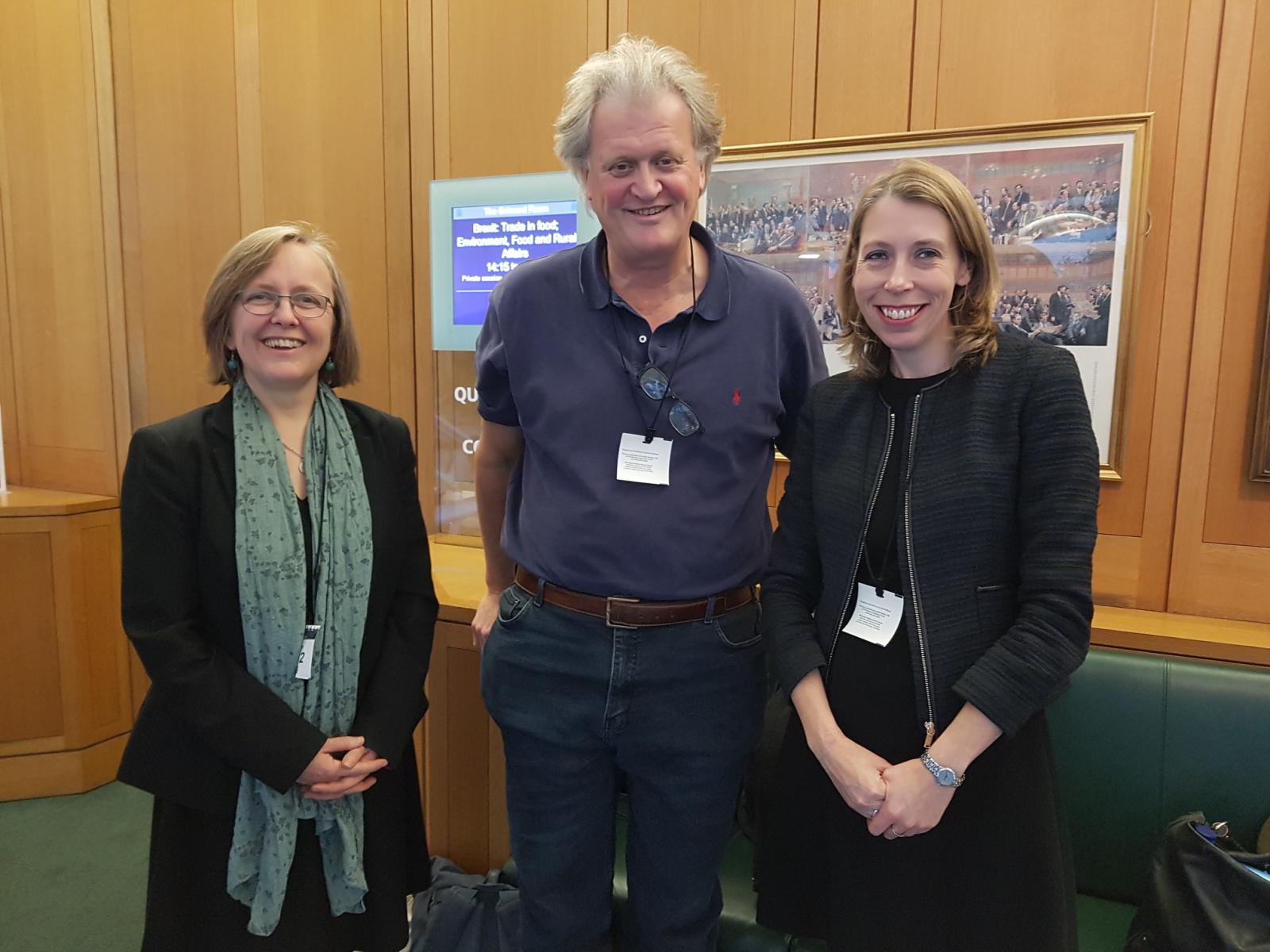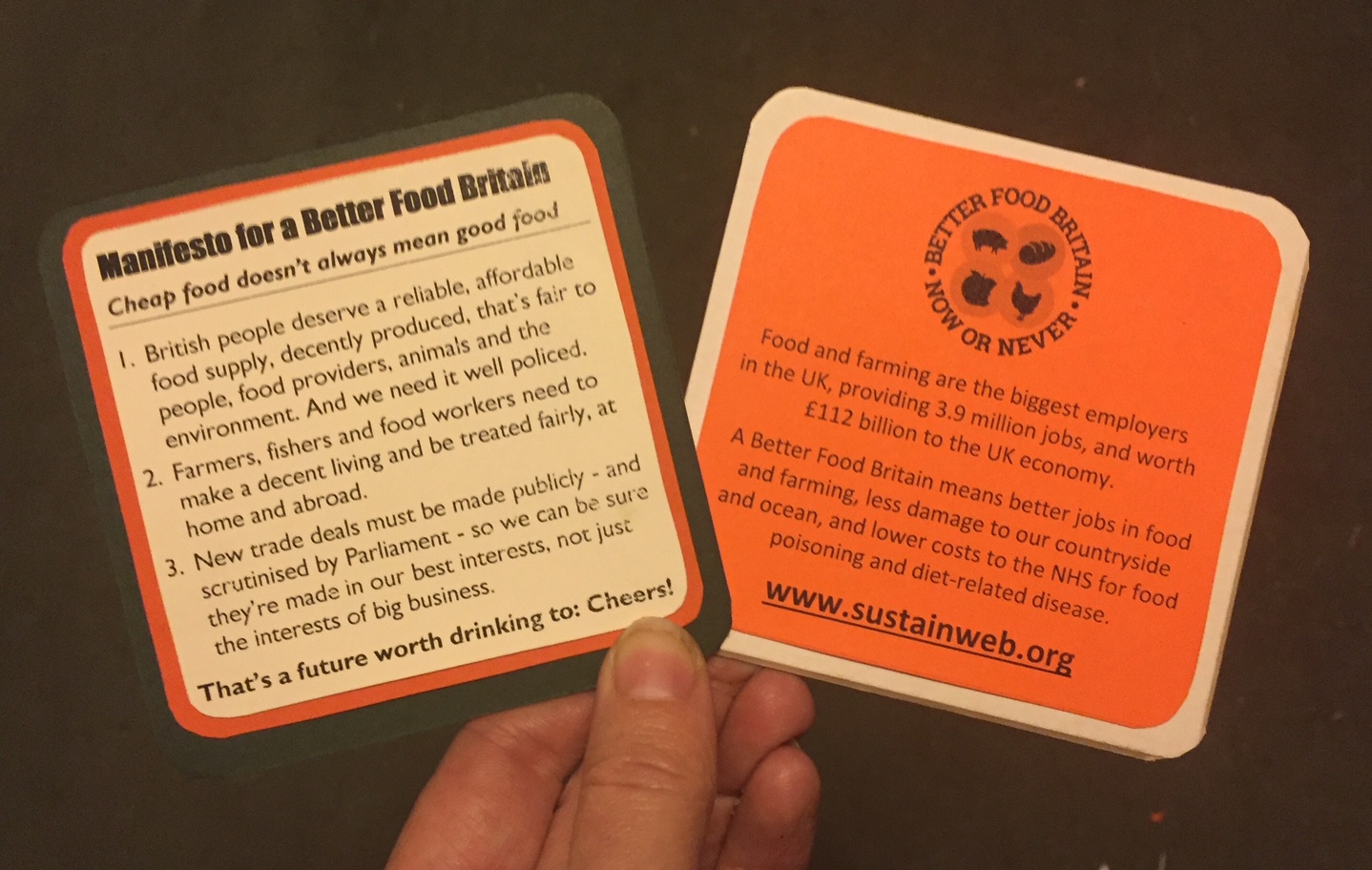 Sustain's chief executive Kath Dalmeny (left) gave evidence in a session with Tim Martin (centre), Chair of the pub chain Wetherspoon and Sue Davies, Strategic Policy Adviser for Which? (Consumers Association) (right).The session was recorded on vide
Sustain's chief executive Kath Dalmeny (left) gave evidence in a session with Tim Martin (centre), Chair of the pub chain Wetherspoon and Sue Davies, Strategic Policy Adviser for Which? (Consumers Association) (right).The session was recorded on vide
Sustain gives evidence to Efra Committee on food standards in trade deals, December 2017
Archived project
Please note that the content on this page has been archived and is not actively reviewed at present.
Kath Dalmeny, Sustain CEO gave oral evidence to the Environment, Food and Rural Affairs (EFRA) Committee on 6th December 2017. On behalf of Sustain alliance members (and whilst handing out Manifestos for a Better Food Britain printed on spoof beermats - see below), she expressed deep concern that the beguiling promise of ‘cheap food’ from new international trade deals could result in serious risks and costs to health, animal welfare and British farming livelihoods.
“If you’re one of the 8.4 million people in the UK struggling to afford enough to eat, then the ‘cheap food’ promised from new international trade deals sounds attractive,” said Kath Dalmeny. “But let’s be clear – cheap food comes at a cost, and somebody has to pay – usually the NHS and British taxpayer. Our Sustain alliance members are telling us that a race to accept cheap food through new international trade deals could result in more food poisoning, dodgy food processing methods to clear up faeces on meat, profligate use of antibiotics in farming, filthy working conditions, low wages, poor animal welfare and thousands more British farmers going out of business.”
Sustain illustrated food safety concerns with an example of US and UK eggs (a story picked up by The Grocer magazine). America is the second biggest exporter of eggs in the world and would expect the UK to accept US standards of production in any new trade deal. In the US, 1 in 6 people can expect to suffer from a foodborne illness, with Salmonella from eggs being a common cause. In the UK, the rate of foodborne illness is much lower, with Salmonella being a greatly reduced cause over recent years due to concerted industry and government action.
If Britain was forced to accept US standards of egg production, this could potentially raise the rate of Salmonella food poisoning among British consumers. Quite apart from the pain and suffering caused, this would also mean additional costs to the NHS and to the British economy from loss of earnings. Who will decide what food poisoning risks Britain is prepared to accept? Who will decide whether British egg farmers working to higher standards will be undermined by low-cost imports of eggs produced to lower standards? And if in future we buy eggs, how will we know they are safe to eat?
Sustain highlighted that such new food trade deals are likely to be made behind closed doors, excluding the British public and Parliament from having their views heard about the food standards that are being discussed and agreed. To illustrate key concerns, Kath Dalmeny handed out 12 spoof beermats (pictured above) summarising Sustain's priorities (text at the end of this article). The beermats were a humorous reference to Wetherspoon's 0.5 million beermats circulated in November, expressing the pub chain Chair’s support for swift Brexit and elimination of trade tariffs. Wetherspoon Chair Tim Martin gave evidence in the same session as Sustain.
Kath Dalmeny said: “We need Government to do a sensible balancing act that makes food affordable, with a range of policies that give a coherent framework, including maintaining good food standards and improving incomes so that everyone can afford to eat well. And we need our UK trade negotiators to know our country’s priorities and red lines on issues such as food safety, animal welfare and working conditions, and be accountable to Parliament and the British public for the trade deals they negotiate.”
The evidence session also highlighted the decline in port health authorities, and environmental health and trading standards officers, who are already struggling to inspect food businesses, and are unlikely to have capacity to respond to the demands from new international trade deals.
The text of Sustain’s beermat

Manifesto for a Better Food Britain
Cheap food doesn’t always mean good food
1. British people deserve a reliable, affordable food supply, decently produced, that’s fair to people, food providers, animals and the environment. And we need it well policed.
2. Farmers, fishers and food workers need to make a decent living and be treated fairly, at home and abroad.
3. New trade deals must be made publicly – and scrutinised by Parliament – so we can be sure they’re made in our best interests, not just the interests of big business.
That’s a future worth drinking to: Cheers!
Brexit: We stand at a cross-roads. When the UK leaves the European Union, will our leaders uphold good standards for our food, farming, fishing and trade deals? And will they agree a sensible deal with the EU? We need to make sure that they do!
Sustain
The Green House
244-254 Cambridge Heath Road
London E2 9DA
020 3559 6777
sustain@sustainweb.org
Sustain advocates food and agriculture policies and practices that enhance the health and welfare of people and animals, improve the working and living environment, promote equity and enrich society and culture.
© Sustain 2025
Registered charity (no. 1018643)
Data privacy & cookies
Icons by Icons8